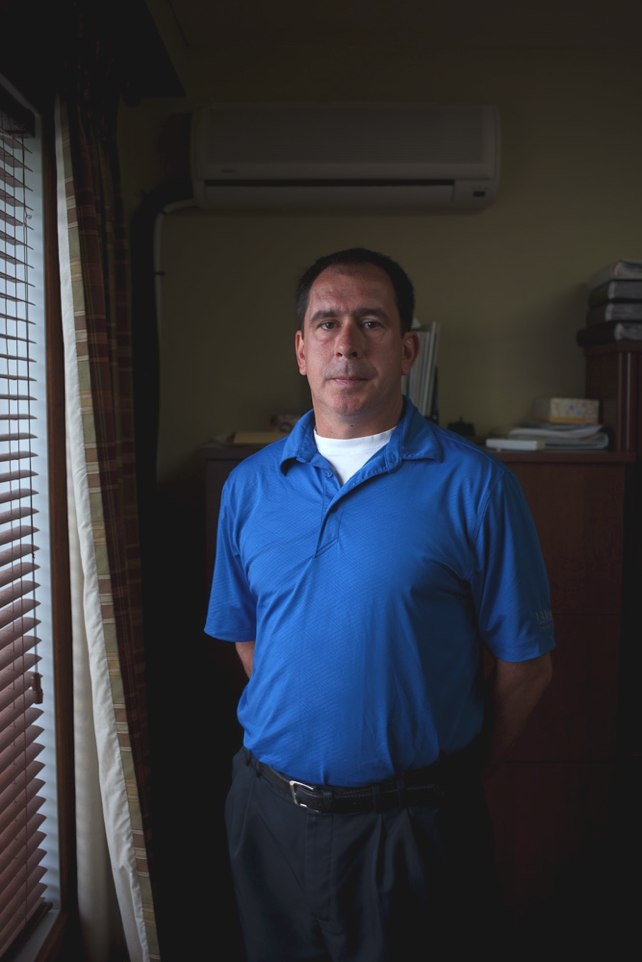Photos by Jean-Francois Hamelin.Rolling hills, clean country air, pristine streets… Lac Mégantic certainly doesn’t feel like a “war zone.” But if you take a peek past the dozens of cameras aimed at the 1km cordoned off area surrounding the centre of the blast, you’ll find absolute destruction—right here in Canada.I visited the site of one of Quebec’s largest ever catastrophes on Tuesday, with photographer Jean-Francois Hamelin, to get an idea of how the citizens were coping.
Advertisement
I can’t really tell you exactly what happened during the explosion—because investigators are discovering and releasing information at a snail’s pace—but I can tell you that a runaway train carrying hundreds of tonnes of crude oil barreled downhill for 12km, away from the town of Nantes, before it derailed right in the centre of Lac Mégantic. Somehow, the train’s brakes were disabled while its conductor was away from the control panel. The mushroom cloud explosion that ensued was so insanely large it could be seen from space.The train’s company Montreal, Maine & Atlantic Railway has taken some of the blame for the massive explosion that killed 15 and has left 60 others still unaccounted for (some say they were possibly vaporized by the blast), but the investigation is still ongoing.While many journalists are using the tragedy as a jump off point to discuss the deregulation of the train industry or the future of oil transport, what everybody in Lac Mégantic is talking about is a pub. Musi Café was not only where many people lost their lives in the crash and subsequent explosion, but it also left a massive void in the town culturally, as it was the go-to spot to chill.Ask anyone in the old tourist town of 6,000 and they’ll tell you that Musi Café—right on Frontenac Street by all the boutiques, pharmacy, grocery store and historic Agnes church, named after the wife of Canada’s first Prime Minister John A. Macdonald—was the only place to hang out. Before the blast, if you were 18, 30, 45 or heck, 16 (it’s Quebec after all) you could plunk your ass down at Musi Café and hear any genre of music, eat bar grub, drink from a selection of 75 different beers, or shoot the shit on the brand new terrasse. Now all that’s left of the town’s social and cultural hub is a charred pile of rubble.
Advertisement
Imagine being woken up in the middle of the night and being told that your city was in flames. This was the reality for Borks Obradovic, an immigrant from Yugoslavia living in Lac Mégantic whose 13 year old son came running to her around 1am screaming: “Get up Mom, the city is exploding!” Her son’s best friend lost his 35-year-old mother at Musi.Natalie Bedard, the owner of a Dollarama store that was demolished by the explosion, said she doesn’t know what she’ll do with herself now that her business has been lost. But at least, she said, she was fortunate to have just lost her business. Natalie’s neighbour lost his wife, brother, and father.Amidst the stories of tragedies and lost loved ones, survivors were haunted by how harrowingly close they were to being one of the missing. My day was filled with people recounting their what if stories—like anyone who had a desk in the World Trade Centre, and was lucky enough to call in sick on September 11th, 2001.While several of the 15 confirmed fatalities in Lac Mégantic were discovered in the charred ruins of Musi Café, local insurance broker Stephane Grenier and his drinking buddy barely made it out alive. After downing a couple of beers, Stephane called it quits at 11pm, but his friend insisted on drinking. His two children pleaded with him to come to another bar outside of town, and after a bit of an argument, he begrudgingly agreed and left. Less than an hour later, the train struck, and the bar that the two men were sitting earlier in the night was completely obliterated.
Advertisement

Stephane Grenier.Likewise, the owner of Musi, along with his pregnant wife, survived the tragedy by leaving work less than an hour before the carnage occurred.During the fire, evacuees were taken in by friends or family in the area—or to the pop-up Red Cross shelter, located in a nearby high school called Polyvante Montignac. Thanks to over $250,000 in generous donations from around Quebec, the high school housed as many as 160 people and also provided food and Salvation Army clothing for many more. Journalists weren’t allowed in the school, but I managed to pop in and chat with some of the displaced townsfolk.I sparked up a conversation with an elderly man forced out of his home, but surprisingly throughout our whole conversation, there wasn’t a single iota of negativity. In fact, he was ecstatic about how he has been treated by the Red Cross and gushed about the sloppy coleslaw.For now, the quaint village streets of Lac Mégantic are at a stand still as the town awaits some sort of normalcy to resume. On street corners, stoops, and by the gigantic metal cross that’s perched high overtop the city’s closest peak, residents were chatting. Others were playing ultimate Frisbee, hosting friends for dinner, or going to picnics.Outside of the school, more and more of the closed off disaster zone is being opened up to residents every day. Evacuees are slowly being allowed home, and the town is gearing up to begin its recovery. For those that need to chat, Red Cross social workers are still roaming the streets talking to people and the Carrefour Youth Employment Centre has organized support groups for kids.
Advertisement
It’s important to realize that Lac Mégantic isn’t just the home of 6,000 people—it’s the centre of everything for 45-minutes in each direction. It’s the epicentre of Quebec's cottage country. If you want to grab a burger, visit the pharmacy, or pick up some brews, Lac Megantic is where you’d go.Everyone I spoke to in Lac Mégantic knows that rebuilding will take a lot of time and money. Stephane Grenier—the insurance broker I mentioned earlier who narrowly escaped death in Musi Café—would like to see the relief money come from the train company whose locomotive exploded in Lac Mégantic. The Quebec government announced on Wednesday that it had allocated $60M to a rebuilding fund.My only beef with the way things are being handled in Lac Mégantic is that politician after politician has been allowed to view the devastation, while journalists are still limited to helicopter and mountaintop photos. In my opinion, if it’s safe enough for our leaders, it’s safe enough for a few journalists who need to help get the story out.But regardless, it’s inspiring to see Lac Mégantic in such high spirits after a terrifying catastrophe. The people there are doing their best to live normally in the wake of the town’s destruction. And from what I saw of the disaster zone, it’s remarkable that the townspeople are so resilient, because it’s a horrifying sight. To see such a strong sense of positivity in the midst of a situation where there is obviously so much to be negative about made me optimistic, and I hope that the government, along with Montreal, Maine & Atlantic, do what’s right to get this town back on its feet.
Advertisement
If you would like to help make sure that the Red Cross keeps doing such a stand-up job for the people of Lac Megantic, you can donate to by telephone at 1-800-418-1111 or on their website.Follow Joel on Twitter: @JoelBalsam
Jean-Francois Hamelin
Jean-Francois Hamelin
Jean-Francois Hamelin
Jean-Francois Hamelin
Jean-Francois Hamelin
Jean-Francois Hamelin
Jean-Francois Hamelin
Jean-Francois Hamelin
Jean-Francois Hamelin
Jean-Francois Hamelin
Jean-Francois Hamelin
Jean-Francois Hamelin
Jean-Francois Hamelin
Jean-Francois Hamelin
Jean-Francois Hamelin
Jean-Francois Hamelin
Jean-Francois Hamelin
Jean-Francois Hamelin
